Презентация part-3-Transfer prices 2014

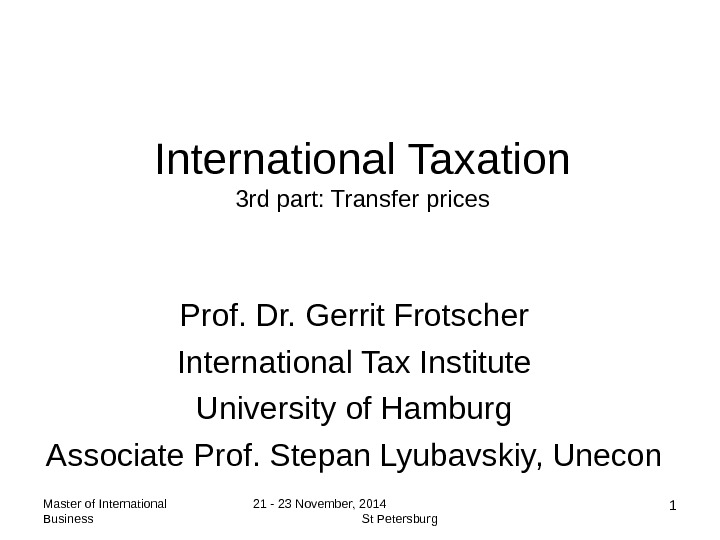
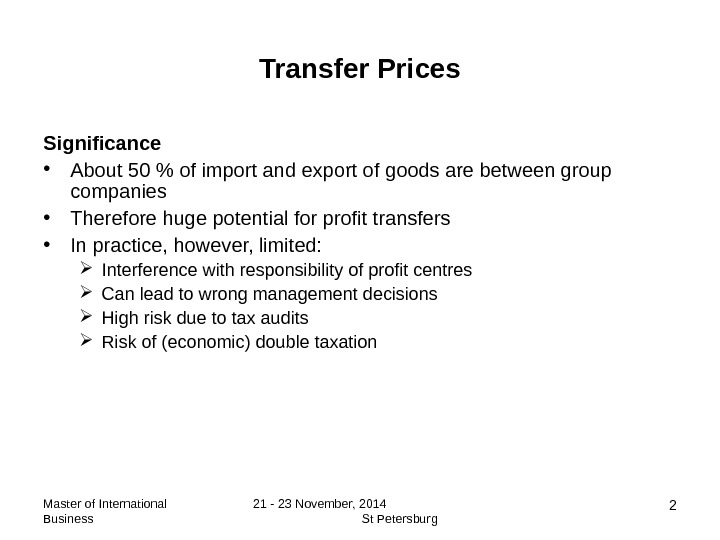
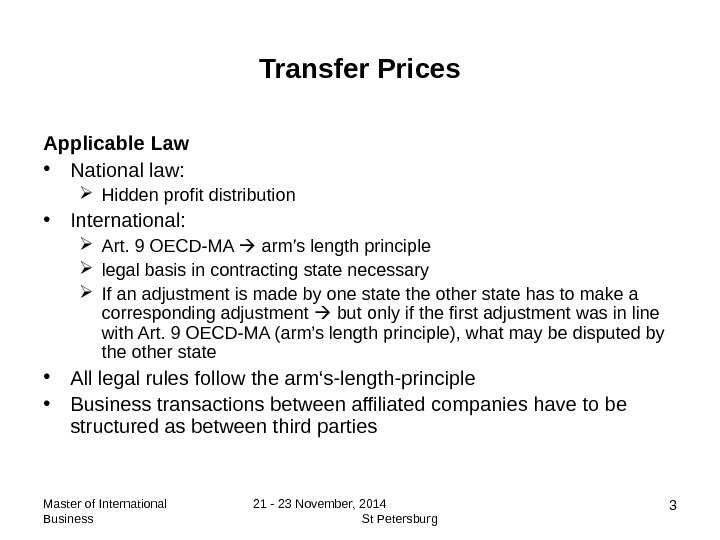
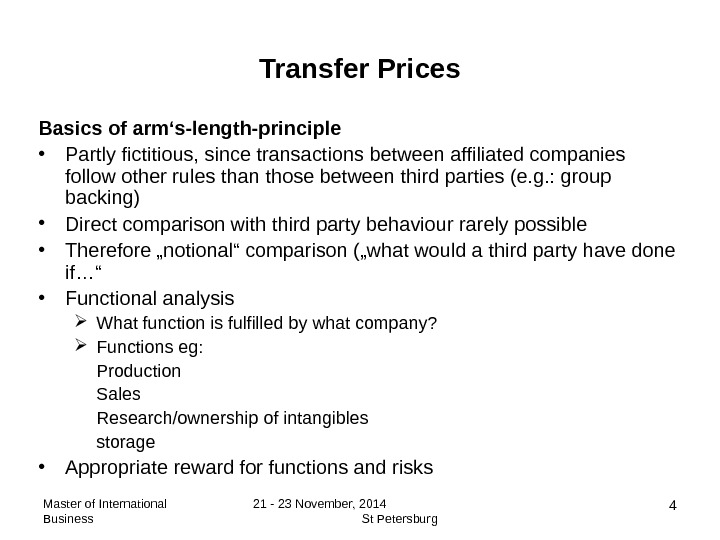
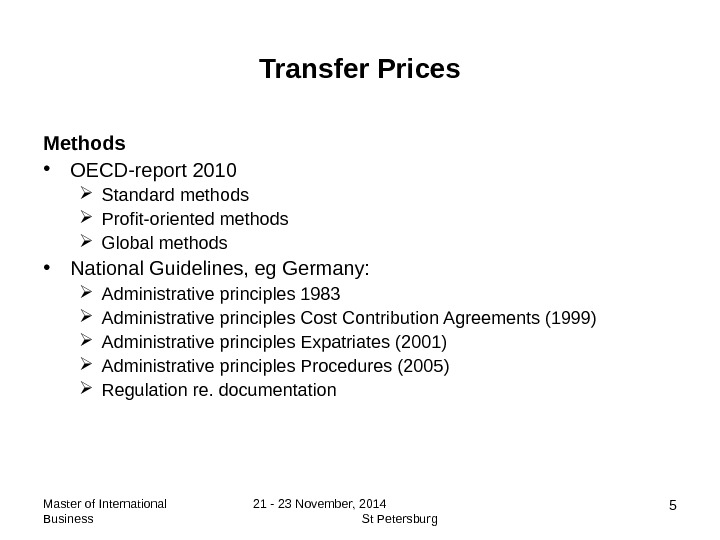
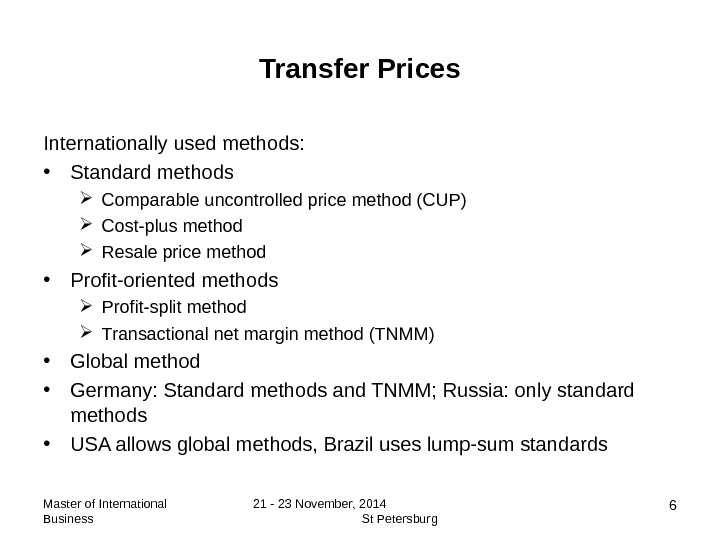

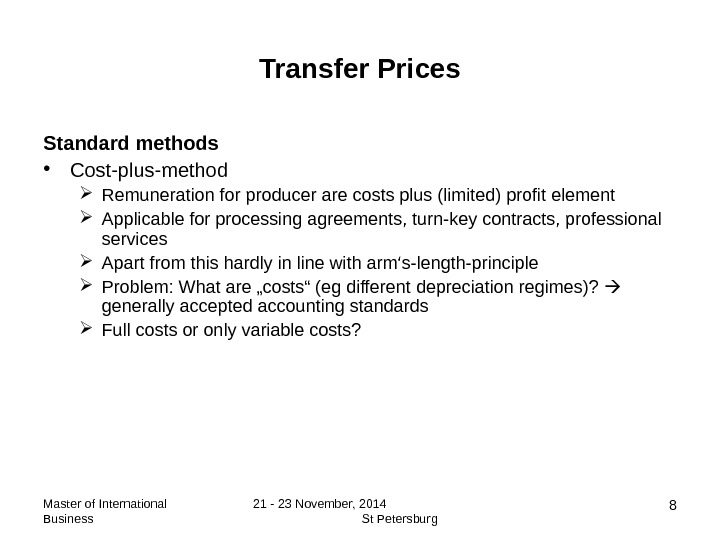
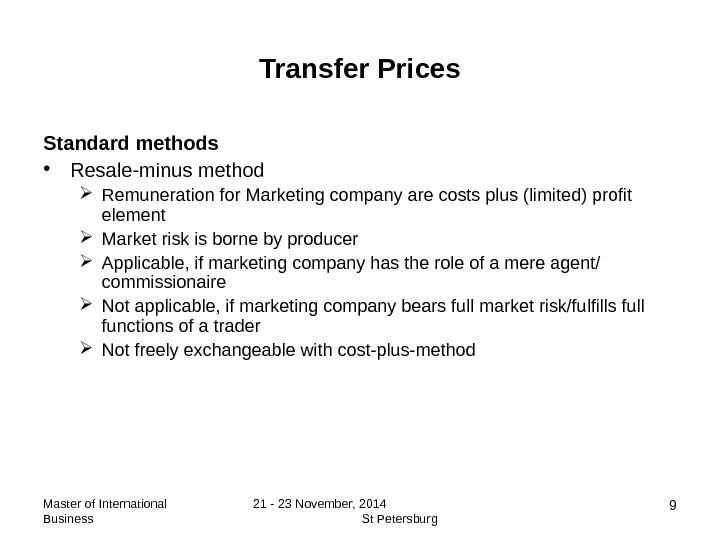
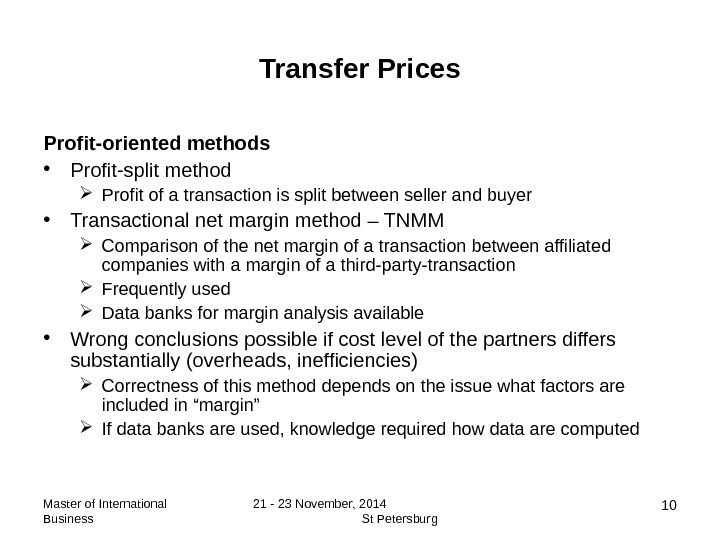
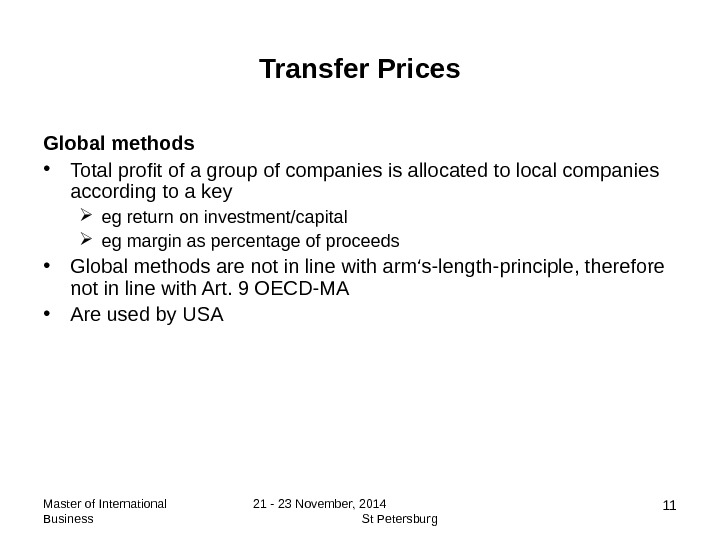
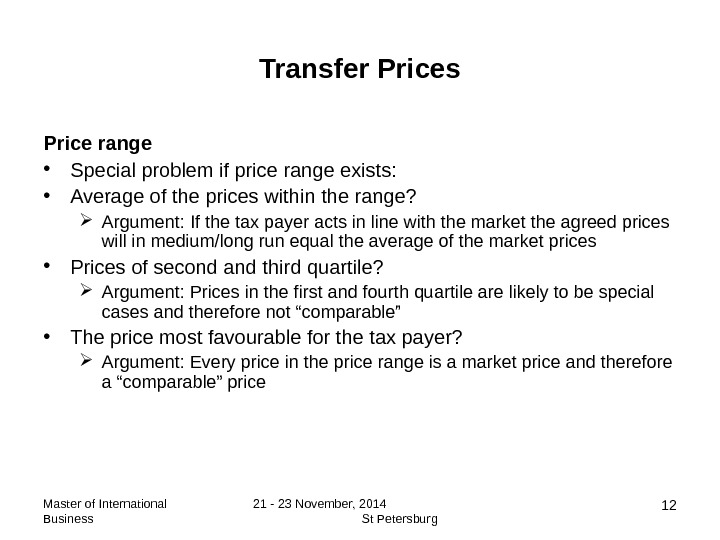
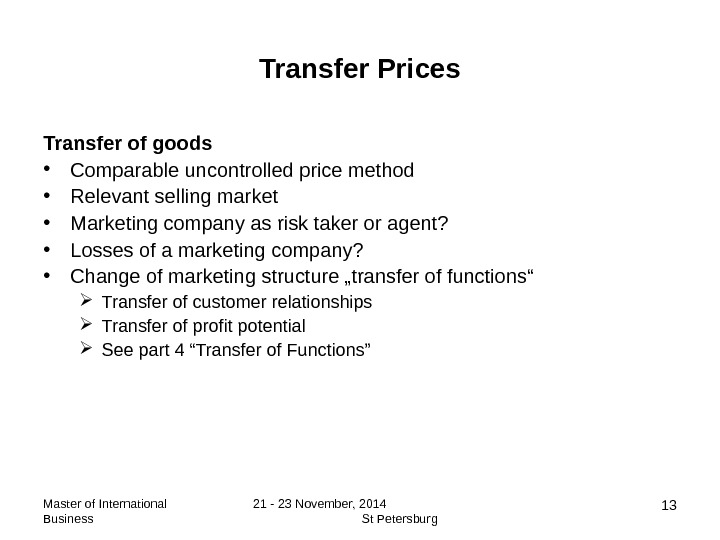
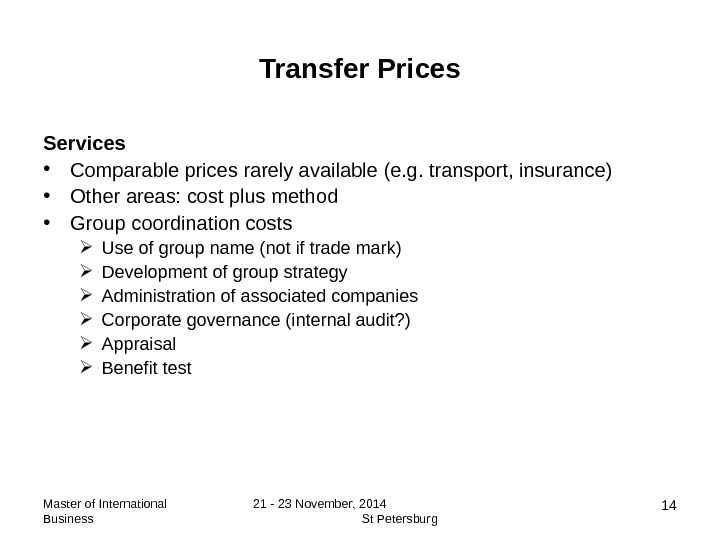
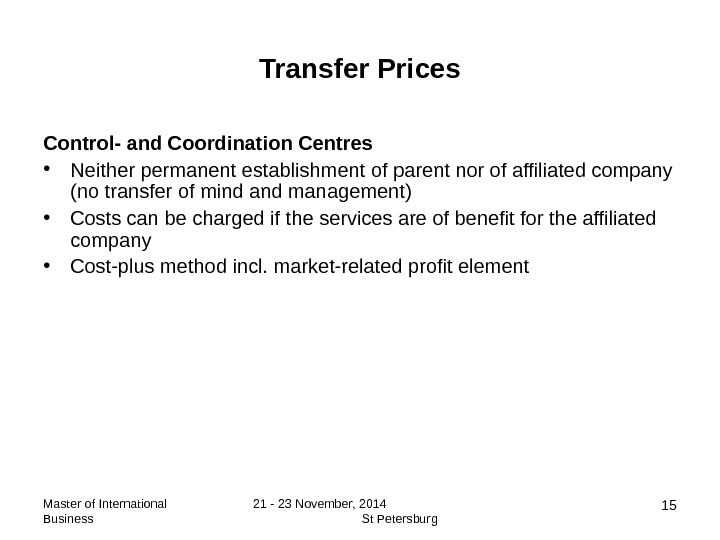
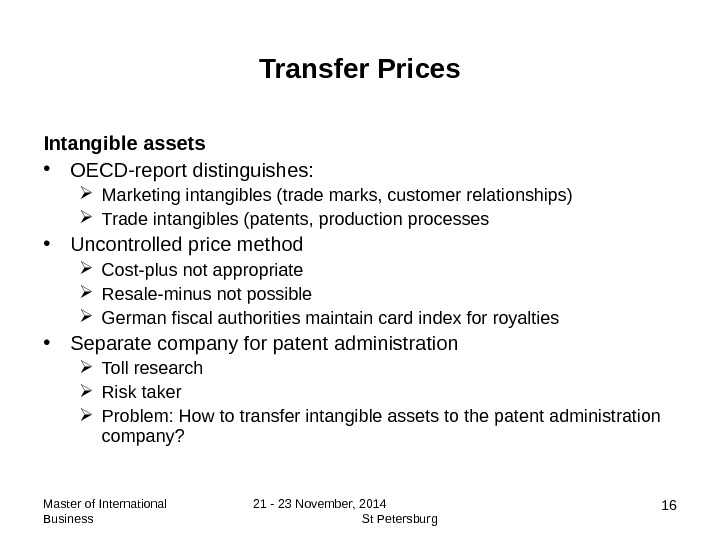
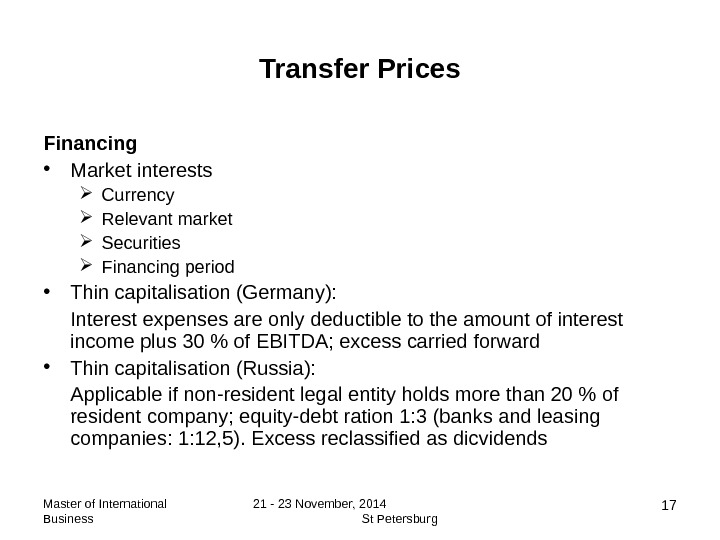
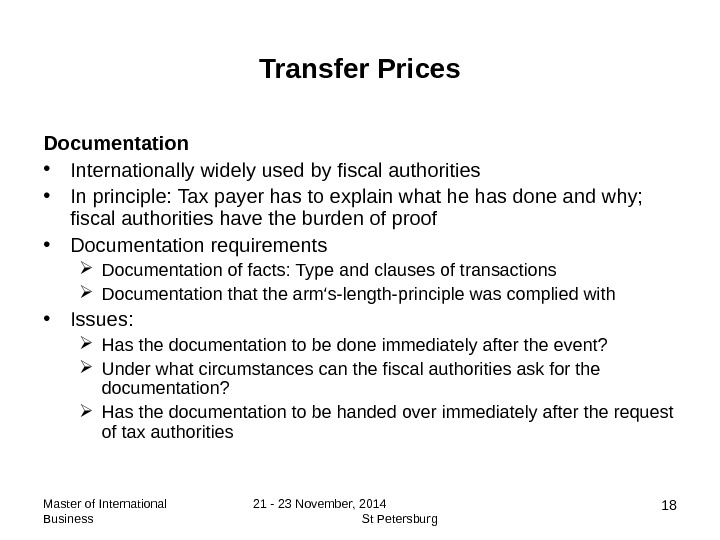
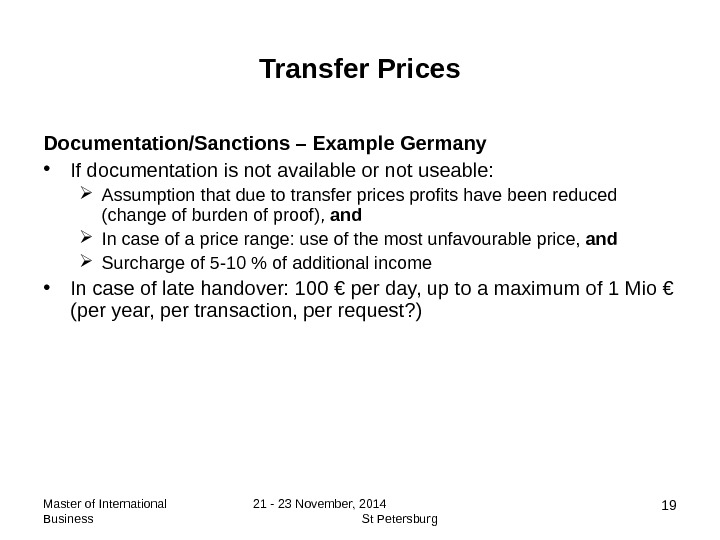
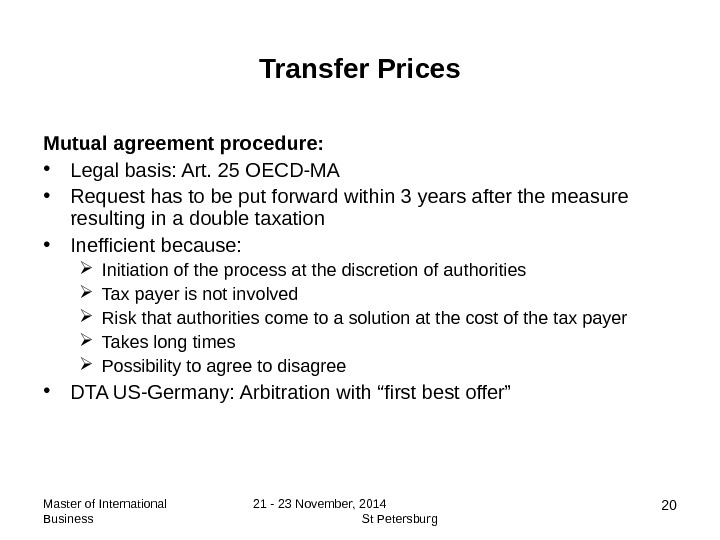
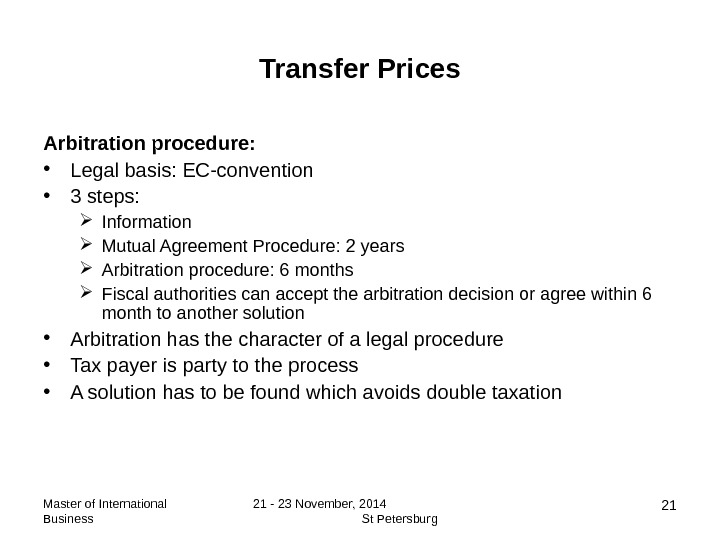
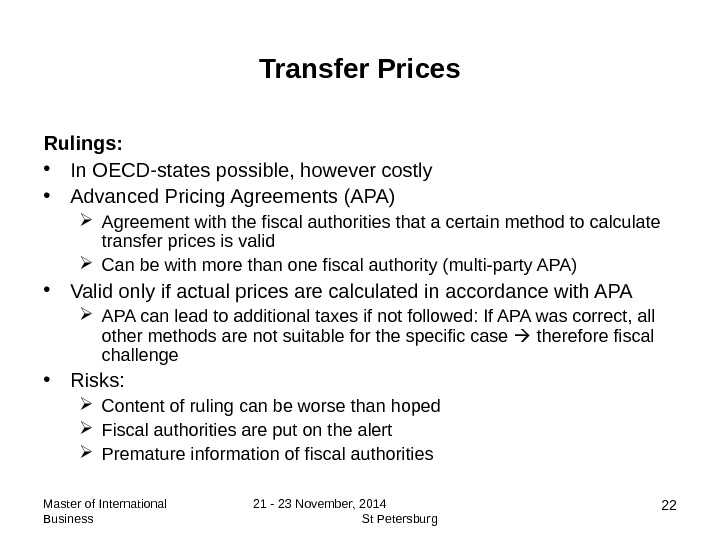
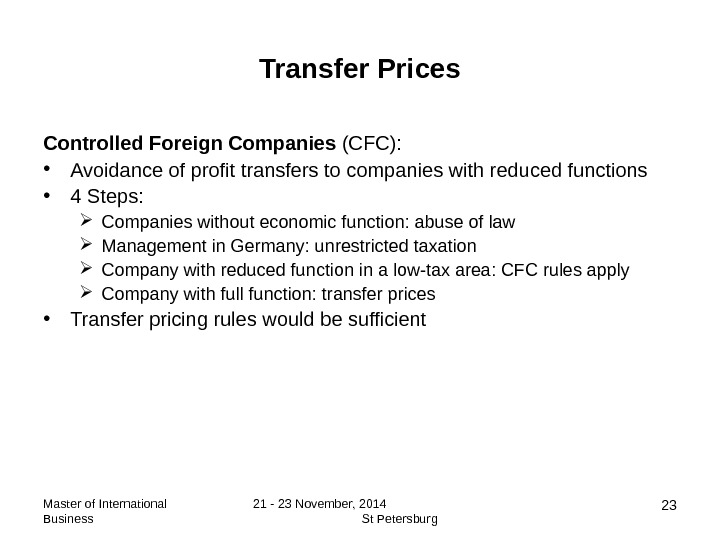
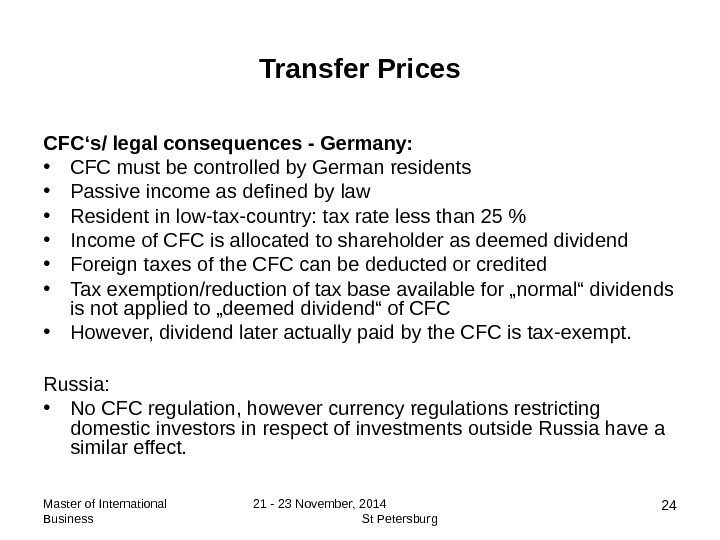
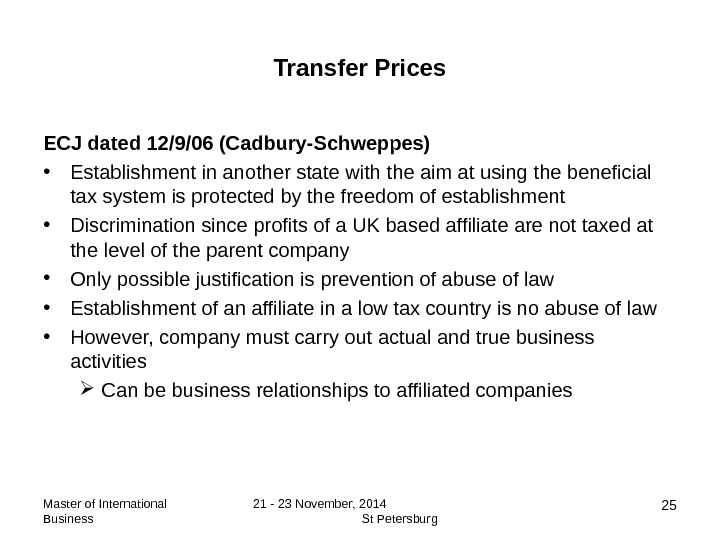
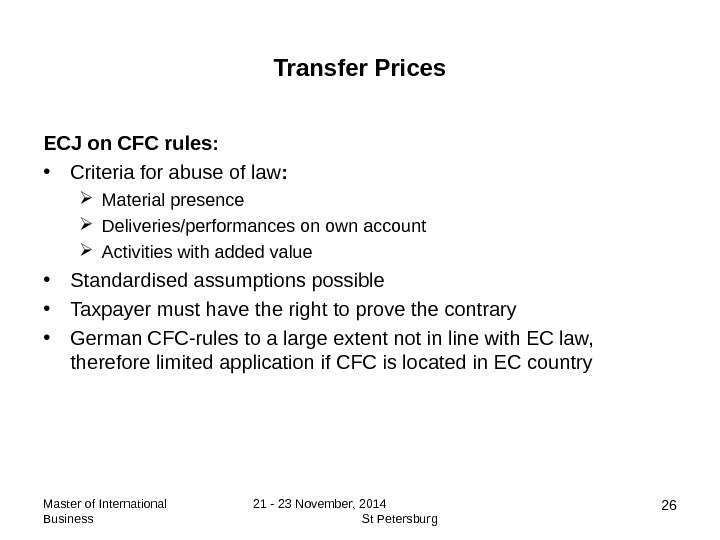
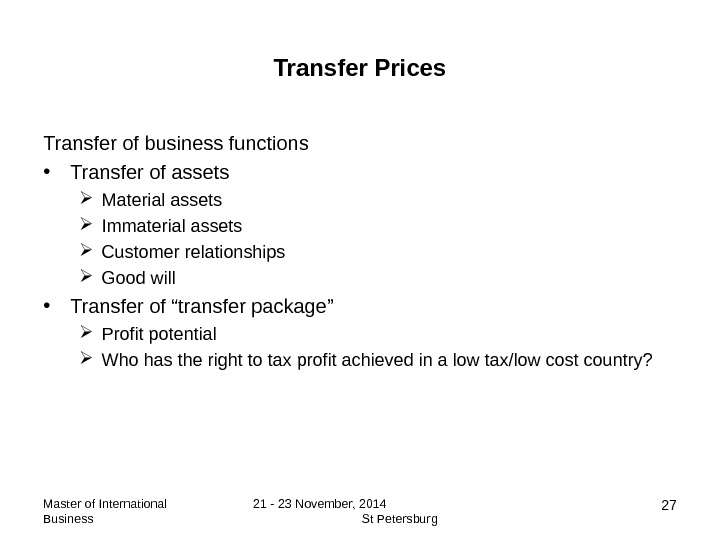
- Размер: 212 Кб
- Количество слайдов: 27
Описание презентации Презентация part-3-Transfer prices 2014 по слайдам
 Master of International Business 21 — 23 November, 2014 St Petersburg 1 International Taxation 3 rd part: Transfer prices Prof. Dr. Gerrit Frotscher International Tax Institute University of Hamburg Associate Prof. Stepan Lyubavskiy, Unecon
Master of International Business 21 — 23 November, 2014 St Petersburg 1 International Taxation 3 rd part: Transfer prices Prof. Dr. Gerrit Frotscher International Tax Institute University of Hamburg Associate Prof. Stepan Lyubavskiy, Unecon
 Master of International Business 21 — 23 November, 2014 St Petersburg 2 Transfer Prices Significance • About 50 % of import and export of goods are between group companies • Therefore huge potential for profit transfers • In practice, however, limited: Interference with responsibility of profit centres Can lead to wrong management decisions High risk due to tax audits Risk of (economic) double taxation
Master of International Business 21 — 23 November, 2014 St Petersburg 2 Transfer Prices Significance • About 50 % of import and export of goods are between group companies • Therefore huge potential for profit transfers • In practice, however, limited: Interference with responsibility of profit centres Can lead to wrong management decisions High risk due to tax audits Risk of (economic) double taxation
 Master of International Business 21 — 23 November, 2014 St Petersburg 3 Transfer Prices Applicable Law • National law: Hidden profit distribution • International: Art. 9 OECD-MA arm’s length principle legal basis in contracting state necessary If an adjustment is made by one state the other state has to make a corresponding adjustment but only if the first adjustment was in line with Art. 9 OECD-MA (arm’s length principle), what may be disputed by the other state • All legal rules follow the arm‘s-length-principle • Business transactions between affiliated companies have to be structured as between third parties
Master of International Business 21 — 23 November, 2014 St Petersburg 3 Transfer Prices Applicable Law • National law: Hidden profit distribution • International: Art. 9 OECD-MA arm’s length principle legal basis in contracting state necessary If an adjustment is made by one state the other state has to make a corresponding adjustment but only if the first adjustment was in line with Art. 9 OECD-MA (arm’s length principle), what may be disputed by the other state • All legal rules follow the arm‘s-length-principle • Business transactions between affiliated companies have to be structured as between third parties
 Master of International Business 21 — 23 November, 2014 St Petersburg 4 Transfer Prices Basics of arm‘s-length-principle • Partly fictitious, since transactions between affiliated companies follow other rules than those between third parties (e. g. : group backing) • Direct comparison with third party behaviour rarely possible • Therefore „notional“ comparison („what would a third party have done if…“ • Functional analysis What function is fulfilled by what company? Functions eg: Production Sales Research/ownership of intangibles storage • Appropriate reward for functions and risks
Master of International Business 21 — 23 November, 2014 St Petersburg 4 Transfer Prices Basics of arm‘s-length-principle • Partly fictitious, since transactions between affiliated companies follow other rules than those between third parties (e. g. : group backing) • Direct comparison with third party behaviour rarely possible • Therefore „notional“ comparison („what would a third party have done if…“ • Functional analysis What function is fulfilled by what company? Functions eg: Production Sales Research/ownership of intangibles storage • Appropriate reward for functions and risks
 Master of International Business 21 — 23 November, 2014 St Petersburg 5 Transfer Prices Methods • OECD-report 2010 Standard methods Profit-oriented methods Global methods • National Guidelines, eg Germany: Administrative principles 1983 Administrative principles Cost Contribution Agreements (1999) Administrative principles Expatriates (2001) Administrative principles Procedures (2005) Regulation re. documentation
Master of International Business 21 — 23 November, 2014 St Petersburg 5 Transfer Prices Methods • OECD-report 2010 Standard methods Profit-oriented methods Global methods • National Guidelines, eg Germany: Administrative principles 1983 Administrative principles Cost Contribution Agreements (1999) Administrative principles Expatriates (2001) Administrative principles Procedures (2005) Regulation re. documentation
 Master of International Business 21 — 23 November, 2014 St Petersburg 6 Transfer Prices Internationally used methods: • Standard methods Comparable uncontrolled price method (CUP) Cost-plus method Resale price method • Profit-oriented methods Profit-split method Transactional net margin method (TNMM) • Global method • Germany: Standard methods and TNMM; Russia: only standard methods • USA allows global methods, Brazil uses lump-sum standards
Master of International Business 21 — 23 November, 2014 St Petersburg 6 Transfer Prices Internationally used methods: • Standard methods Comparable uncontrolled price method (CUP) Cost-plus method Resale price method • Profit-oriented methods Profit-split method Transactional net margin method (TNMM) • Global method • Germany: Standard methods and TNMM; Russia: only standard methods • USA allows global methods, Brazil uses lump-sum standards
 Master of International Business 21 — 23 November, 2014 St Petersburg 7 Transfer Prices Standard methods • Comparable uncontrolled price method Direct application of arm‘s-length-principle Comparison with transactions between third parties, between taxpayer and a third party or between affiliate of taxpayer and a third party Intra-group deals are not “comparable” because not “uncontrolled” State-controlled prices are not “uncontrolled” Requires knowledge of all details of the transaction (volume, quality, freight, risk of losses, currency, payment terms, guaranties etc) Full knowledge of details of third-party transaction in practice not available Risk that fiscal authorities use „better knowledge of hindsight“
Master of International Business 21 — 23 November, 2014 St Petersburg 7 Transfer Prices Standard methods • Comparable uncontrolled price method Direct application of arm‘s-length-principle Comparison with transactions between third parties, between taxpayer and a third party or between affiliate of taxpayer and a third party Intra-group deals are not “comparable” because not “uncontrolled” State-controlled prices are not “uncontrolled” Requires knowledge of all details of the transaction (volume, quality, freight, risk of losses, currency, payment terms, guaranties etc) Full knowledge of details of third-party transaction in practice not available Risk that fiscal authorities use „better knowledge of hindsight“
 Master of International Business 21 — 23 November, 2014 St Petersburg 8 Transfer Prices Standard methods • Cost-plus-method Remuneration for producer are costs plus (limited) profit element Applicable for processing agreements, turn-key contracts, professional services Apart from this hardly in line with arm‘s-length-principle Problem: What are „costs“ (eg different depreciation regimes)? generally accepted accounting standards Full costs or only variable costs?
Master of International Business 21 — 23 November, 2014 St Petersburg 8 Transfer Prices Standard methods • Cost-plus-method Remuneration for producer are costs plus (limited) profit element Applicable for processing agreements, turn-key contracts, professional services Apart from this hardly in line with arm‘s-length-principle Problem: What are „costs“ (eg different depreciation regimes)? generally accepted accounting standards Full costs or only variable costs?
 Master of International Business 21 — 23 November, 2014 St Petersburg 9 Transfer Prices Standard methods • Resale-minus method Remuneration for Marketing company are costs plus (limited) profit element Market risk is borne by producer Applicable, if marketing company has the role of a mere agent/ commissionaire Not applicable, if marketing company bears full market risk/fulfills full functions of a trader Not freely exchangeable with cost-plus-method
Master of International Business 21 — 23 November, 2014 St Petersburg 9 Transfer Prices Standard methods • Resale-minus method Remuneration for Marketing company are costs plus (limited) profit element Market risk is borne by producer Applicable, if marketing company has the role of a mere agent/ commissionaire Not applicable, if marketing company bears full market risk/fulfills full functions of a trader Not freely exchangeable with cost-plus-method
 Master of International Business 21 — 23 November, 2014 St Petersburg 10 Transfer Prices Profit-oriented methods • Profit-split method Profit of a transaction is split between seller and buyer • Transactional net margin method – TNMM Comparison of the net margin of a transaction between affiliated companies with a margin of a third-party-transaction Frequently used Data banks for margin analysis available • Wrong conclusions possible if cost level of the partners differs substantially (overheads, inefficiencies) Correctness of this method depends on the issue what factors are included in “margin” If data banks are used, knowledge required how data are computed
Master of International Business 21 — 23 November, 2014 St Petersburg 10 Transfer Prices Profit-oriented methods • Profit-split method Profit of a transaction is split between seller and buyer • Transactional net margin method – TNMM Comparison of the net margin of a transaction between affiliated companies with a margin of a third-party-transaction Frequently used Data banks for margin analysis available • Wrong conclusions possible if cost level of the partners differs substantially (overheads, inefficiencies) Correctness of this method depends on the issue what factors are included in “margin” If data banks are used, knowledge required how data are computed
 Master of International Business 21 — 23 November, 2014 St Petersburg 11 Transfer Prices Global methods • Total profit of a group of companies is allocated to local companies according to a key eg return on investment/capital eg margin as percentage of proceeds • Global methods are not in line with arm‘s-length-principle, therefore not in line with Art. 9 OECD-MA • Are used by US
Master of International Business 21 — 23 November, 2014 St Petersburg 11 Transfer Prices Global methods • Total profit of a group of companies is allocated to local companies according to a key eg return on investment/capital eg margin as percentage of proceeds • Global methods are not in line with arm‘s-length-principle, therefore not in line with Art. 9 OECD-MA • Are used by US
 Master of International Business 21 — 23 November, 2014 St Petersburg 12 Transfer Prices Price range • Special problem if price range exists: • Average of the prices within the range? Argument: If the tax payer acts in line with the market the agreed prices will in medium/long run equal the average of the market prices • Prices of second and third quartile? Argument: Prices in the first and fourth quartile are likely to be special cases and therefore not “comparable” • The price most favourable for the tax payer? Argument: Every price in the price range is a market price and therefore a “comparable” price
Master of International Business 21 — 23 November, 2014 St Petersburg 12 Transfer Prices Price range • Special problem if price range exists: • Average of the prices within the range? Argument: If the tax payer acts in line with the market the agreed prices will in medium/long run equal the average of the market prices • Prices of second and third quartile? Argument: Prices in the first and fourth quartile are likely to be special cases and therefore not “comparable” • The price most favourable for the tax payer? Argument: Every price in the price range is a market price and therefore a “comparable” price
 Master of International Business 21 — 23 November, 2014 St Petersburg 13 Transfer Prices Transfer of goods • Comparable uncontrolled price method • Relevant selling market • Marketing company as risk taker or agent? • Losses of a marketing company? • Change of marketing structure „transfer of functions“ Transfer of customer relationships Transfer of profit potential See part 4 “Transfer of Functions”
Master of International Business 21 — 23 November, 2014 St Petersburg 13 Transfer Prices Transfer of goods • Comparable uncontrolled price method • Relevant selling market • Marketing company as risk taker or agent? • Losses of a marketing company? • Change of marketing structure „transfer of functions“ Transfer of customer relationships Transfer of profit potential See part 4 “Transfer of Functions”
 Master of International Business 21 — 23 November, 2014 St Petersburg 14 Transfer Prices Services • Comparable prices rarely available (e. g. transport, insurance) • Other areas: cost plus method • Group coordination costs Use of group name (not if trade mark) Development of group strategy Administration of associated companies Corporate governance (internal audit? ) Appraisal Benefit test
Master of International Business 21 — 23 November, 2014 St Petersburg 14 Transfer Prices Services • Comparable prices rarely available (e. g. transport, insurance) • Other areas: cost plus method • Group coordination costs Use of group name (not if trade mark) Development of group strategy Administration of associated companies Corporate governance (internal audit? ) Appraisal Benefit test
 Master of International Business 21 — 23 November, 2014 St Petersburg 15 Transfer Prices Control- and Coordination Centres • Neither permanent establishment of parent nor of affiliated company (no transfer of mind and management) • Costs can be charged if the services are of benefit for the affiliated company • Cost-plus method incl. market-related profit element
Master of International Business 21 — 23 November, 2014 St Petersburg 15 Transfer Prices Control- and Coordination Centres • Neither permanent establishment of parent nor of affiliated company (no transfer of mind and management) • Costs can be charged if the services are of benefit for the affiliated company • Cost-plus method incl. market-related profit element
 Master of International Business 21 — 23 November, 2014 St Petersburg 16 Transfer Prices Intangible assets • OECD-report distinguishes: Marketing intangibles (trade marks, customer relationships) Trade intangibles (patents, production processes • Uncontrolled price method Cost-plus not appropriate Resale-minus not possible German fiscal authorities maintain card index for royalties • Separate company for patent administration Toll research Risk taker Problem: How to transfer intangible assets to the patent administration company?
Master of International Business 21 — 23 November, 2014 St Petersburg 16 Transfer Prices Intangible assets • OECD-report distinguishes: Marketing intangibles (trade marks, customer relationships) Trade intangibles (patents, production processes • Uncontrolled price method Cost-plus not appropriate Resale-minus not possible German fiscal authorities maintain card index for royalties • Separate company for patent administration Toll research Risk taker Problem: How to transfer intangible assets to the patent administration company?
 Master of International Business 21 — 23 November, 2014 St Petersburg 17 Transfer Prices Financing • Market interests Currency Relevant market Securities Financing period • Thin capitalisation (Germany): Interest expenses are only deductible to the amount of interest income plus 30 % of EBITDA; excess carried forward • Thin capitalisation (Russia): Applicable if non-resident legal entity holds more than 20 % of resident company; equity-debt ration 1: 3 (banks and leasing companies: 1: 12, 5). Excess reclassified as dicvidends
Master of International Business 21 — 23 November, 2014 St Petersburg 17 Transfer Prices Financing • Market interests Currency Relevant market Securities Financing period • Thin capitalisation (Germany): Interest expenses are only deductible to the amount of interest income plus 30 % of EBITDA; excess carried forward • Thin capitalisation (Russia): Applicable if non-resident legal entity holds more than 20 % of resident company; equity-debt ration 1: 3 (banks and leasing companies: 1: 12, 5). Excess reclassified as dicvidends
 Master of International Business 21 — 23 November, 2014 St Petersburg 18 Transfer Prices Documentation • Internationally widely used by fiscal authorities • In principle: Tax payer has to explain what he has done and why; fiscal authorities have the burden of proof • Documentation requirements Documentation of facts: Type and clauses of transactions Documentation that the arm‘s-length-principle was complied with • Issues: Has the documentation to be done immediately after the event? Under what circumstances can the fiscal authorities ask for the documentation? Has the documentation to be handed over immediately after the request of tax authorities
Master of International Business 21 — 23 November, 2014 St Petersburg 18 Transfer Prices Documentation • Internationally widely used by fiscal authorities • In principle: Tax payer has to explain what he has done and why; fiscal authorities have the burden of proof • Documentation requirements Documentation of facts: Type and clauses of transactions Documentation that the arm‘s-length-principle was complied with • Issues: Has the documentation to be done immediately after the event? Under what circumstances can the fiscal authorities ask for the documentation? Has the documentation to be handed over immediately after the request of tax authorities
 Master of International Business 21 — 23 November, 2014 St Petersburg 19 Transfer Prices Documentation/Sanctions – Example Germany • If documentation is not available or not useable: Assumption that due to transfer prices profits have been reduced (change of burden of proof), and In case of a price range: use of the most unfavourable price, and Surcharge of 5 -10 % of additional income • In case of late handover: 100 € per day, up to a maximum of 1 Mio € (per year, per transaction, per request? )
Master of International Business 21 — 23 November, 2014 St Petersburg 19 Transfer Prices Documentation/Sanctions – Example Germany • If documentation is not available or not useable: Assumption that due to transfer prices profits have been reduced (change of burden of proof), and In case of a price range: use of the most unfavourable price, and Surcharge of 5 -10 % of additional income • In case of late handover: 100 € per day, up to a maximum of 1 Mio € (per year, per transaction, per request? )
 Master of International Business 21 — 23 November, 2014 St Petersburg 20 Transfer Prices Mutual agreement procedure: • Legal basis: Art. 25 OECD-MA • Request has to be put forward within 3 years after the measure resulting in a double taxation • Inefficient because: Initiation of the process at the discretion of authorities Tax payer is not involved Risk that authorities come to a solution at the cost of the tax payer Takes long times Possibility to agree to disagree • DTA US-Germany: Arbitration with “first best offer”
Master of International Business 21 — 23 November, 2014 St Petersburg 20 Transfer Prices Mutual agreement procedure: • Legal basis: Art. 25 OECD-MA • Request has to be put forward within 3 years after the measure resulting in a double taxation • Inefficient because: Initiation of the process at the discretion of authorities Tax payer is not involved Risk that authorities come to a solution at the cost of the tax payer Takes long times Possibility to agree to disagree • DTA US-Germany: Arbitration with “first best offer”
 Master of International Business 21 — 23 November, 2014 St Petersburg 21 Transfer Prices Arbitration procedure: • Legal basis: EC-convention • 3 steps: Information Mutual Agreement Procedure: 2 years Arbitration procedure: 6 months Fiscal authorities can accept the arbitration decision or agree within 6 month to another solution • Arbitration has the character of a legal procedure • Tax payer is party to the process • A solution has to be found which avoids double taxation
Master of International Business 21 — 23 November, 2014 St Petersburg 21 Transfer Prices Arbitration procedure: • Legal basis: EC-convention • 3 steps: Information Mutual Agreement Procedure: 2 years Arbitration procedure: 6 months Fiscal authorities can accept the arbitration decision or agree within 6 month to another solution • Arbitration has the character of a legal procedure • Tax payer is party to the process • A solution has to be found which avoids double taxation
 Master of International Business 21 — 23 November, 2014 St Petersburg 22 Transfer Prices Rulings: • In OECD-states possible, however costly • Advanced Pricing Agreements (APA) Agreement with the fiscal authorities that a certain method to calculate transfer prices is valid Can be with more than one fiscal authority (multi-party APA) • Valid only if actual prices are calculated in accordance with APA can lead to additional taxes if not followed: If APA was correct, all other methods are not suitable for the specific case therefore fiscal challenge • Risks: Content of ruling can be worse than hoped Fiscal authorities are put on the alert Premature information of fiscal authorities
Master of International Business 21 — 23 November, 2014 St Petersburg 22 Transfer Prices Rulings: • In OECD-states possible, however costly • Advanced Pricing Agreements (APA) Agreement with the fiscal authorities that a certain method to calculate transfer prices is valid Can be with more than one fiscal authority (multi-party APA) • Valid only if actual prices are calculated in accordance with APA can lead to additional taxes if not followed: If APA was correct, all other methods are not suitable for the specific case therefore fiscal challenge • Risks: Content of ruling can be worse than hoped Fiscal authorities are put on the alert Premature information of fiscal authorities
 Master of International Business 21 — 23 November, 2014 St Petersburg 23 Transfer Prices Controlled Foreign Companies (CFC): • Avoidance of profit transfers to companies with reduced functions • 4 Steps: Companies without economic function: abuse of law Management in Germany: unrestricted taxation Company with reduced function in a low-tax area: CFC rules apply Company with full function: transfer prices • Transfer pricing rules would be sufficient
Master of International Business 21 — 23 November, 2014 St Petersburg 23 Transfer Prices Controlled Foreign Companies (CFC): • Avoidance of profit transfers to companies with reduced functions • 4 Steps: Companies without economic function: abuse of law Management in Germany: unrestricted taxation Company with reduced function in a low-tax area: CFC rules apply Company with full function: transfer prices • Transfer pricing rules would be sufficient
 Master of International Business 21 — 23 November, 2014 St Petersburg 24 Transfer Prices CFC‘s/ legal consequences — Germany: • CFC must be controlled by German residents • Passive income as defined by law • Resident in low-tax-country: tax rate less than 25 % • Income of CFC is allocated to shareholder as deemed dividend • Foreign taxes of the CFC can be deducted or credited • Tax exemption/reduction of tax base available for „normal“ dividends is not applied to „deemed dividend“ of CFC • However, dividend later actually paid by the CFC is tax-exempt. Russia: • No CFC regulation, however currency regulations restricting domestic investors in respect of investments outside Russia have a similar effect.
Master of International Business 21 — 23 November, 2014 St Petersburg 24 Transfer Prices CFC‘s/ legal consequences — Germany: • CFC must be controlled by German residents • Passive income as defined by law • Resident in low-tax-country: tax rate less than 25 % • Income of CFC is allocated to shareholder as deemed dividend • Foreign taxes of the CFC can be deducted or credited • Tax exemption/reduction of tax base available for „normal“ dividends is not applied to „deemed dividend“ of CFC • However, dividend later actually paid by the CFC is tax-exempt. Russia: • No CFC regulation, however currency regulations restricting domestic investors in respect of investments outside Russia have a similar effect.
 Master of International Business 21 — 23 November, 2014 St Petersburg 25 Transfer Prices ECJ dated 12/9/06 (Cadbury-Schweppes) • Establishment in another state with the aim at using the beneficial tax system is protected by the freedom of establishment • Discrimination since profits of a UK based affiliate are not taxed at the level of the parent company • Only possible justification is prevention of abuse of law • Establishment of an affiliate in a low tax country is no abuse of law • However, company must carry out actual and true business activities Can be business relationships to affiliated companies
Master of International Business 21 — 23 November, 2014 St Petersburg 25 Transfer Prices ECJ dated 12/9/06 (Cadbury-Schweppes) • Establishment in another state with the aim at using the beneficial tax system is protected by the freedom of establishment • Discrimination since profits of a UK based affiliate are not taxed at the level of the parent company • Only possible justification is prevention of abuse of law • Establishment of an affiliate in a low tax country is no abuse of law • However, company must carry out actual and true business activities Can be business relationships to affiliated companies
 Master of International Business 21 — 23 November, 2014 St Petersburg 26 Transfer Prices ECJ on CFC rules: • Criteria for abuse of law : Material presence Deliveries/performances on own account Activities with added value • Standardised assumptions possible • Taxpayer must have the right to prove the contrary • German CFC-rules to a large extent not in line with EC law, therefore limited application if CFC is located in EC country
Master of International Business 21 — 23 November, 2014 St Petersburg 26 Transfer Prices ECJ on CFC rules: • Criteria for abuse of law : Material presence Deliveries/performances on own account Activities with added value • Standardised assumptions possible • Taxpayer must have the right to prove the contrary • German CFC-rules to a large extent not in line with EC law, therefore limited application if CFC is located in EC country
 Master of International Business 21 — 23 November, 2014 St Petersburg 27 Transfer Prices Transfer of business functions • Transfer of assets Material assets Immaterial assets Customer relationships Good will • Transfer of “transfer package” Profit potential Who has the right to tax profit achieved in a low tax/low cost country?
Master of International Business 21 — 23 November, 2014 St Petersburg 27 Transfer Prices Transfer of business functions • Transfer of assets Material assets Immaterial assets Customer relationships Good will • Transfer of “transfer package” Profit potential Who has the right to tax profit achieved in a low tax/low cost country?

